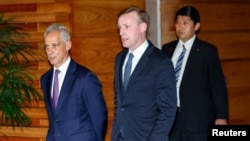White House national security adviser Jake Sullivan is on an Asian diplomatic blitz this week, participating in a trilateral meeting with his counterparts from Japan and South Korea on Thursday.
On Friday, he met with his counterparts from Japan and the Philippines, in the first trilateral engagement of that group's national security advisers.
While the White House readout of both meetings contained standard wording including the importance of maintaining peace and stability in the region, the statement on the U.S.–Japan–Philippines trilateral meeting is notable in that it mentions "unilateral attempts to change the status quo by force or coercion," a veiled reference to Chinese actions.
Sullivan's meetings in Tokyo follow a stop in New Delhi earlier this week to finalize details for next week's official visit to the White House by Prime Minister Narendra Modi of India – a country that is becoming increasingly indispensable for Washington's goals in the region.
While the timing is "coincidental," according to an administration official, Sullivan's meetings take place just days before Secretary of State Antony Blinken's trip to Beijing this weekend.
The State Department says the Beijing visit, which Washington postponed after it shot down a suspected Chinese spy balloon flying over U.S. territory in February, is part of the Biden administration's efforts to repair deteriorating ties and keep lines of communication open between Washington and Beijing.
Strengthening alliances and partnerships is a clear component of the administration's strategy to effectively compete with China, while Blinken's trip to Beijing is aimed at stabilizing the relationship, said Yun Sun, director of the China Program at the Stimson Center. "They are two sides of the same coin," she told VOA.
Working with more than one country at a time to shore up allies is part of what's often called the administration's "minilateral" strategy. The goal is to play up the strengths of each partner and encourage them to work together.
"We will not be able to get one big grouping, so let's do lots of minilaterals," said Aparna Pande, director of the Initiative on the Future of India and South Asia at the Hudson Institute in Washington. That way, she told VOA, the U.S. carries less burden, even as it acts as the glue that keeps the groupings together.
Geostrategic Indo-Pacific
The busy week of diplomacy is designed to reaffirm the message that Washington wants to bolster ties with allies and partners in the Indo-Pacific, which it sees as the world's key geostrategic region with vast opportunities for greater economic security cooperation, including on critical and emerging technologies.
The region's challenges include North Korean nuclear threats, highlighted by Pyongyang's launch on Thursday of two short-range ballistic missiles. China, meanwhile, has massively increased its military spending in the past decade and has engaged in what Washington calls "economic coercion," imposing economic costs on various countries to achieve political goals.
Amid Beijing's maritime expansion in the South China Sea and tensions with Taiwan, the war on Ukraine has amplified the region's threat assessment, reminding countries of the devastating impact of a potential Chinese invasion.
This leads to increased defense spending by individual countries and demands for an increasingly muscular American presence in the region, with more joint military exercises, a ramped-up defense posture and a stronger nuclear umbrella for South Korea, known as extended deterrence.
"We know they tend to balance against threats, and countries are feeling threatened," said Zack Cooper, senior fellow at the American Enterprise Institute, at a recent event with the Center for Strategic and International Studies.
The Philippines, whose coast guard has had increasingly frequent confrontations with the Chinese navy in the disputed waters of the South China Sea, is one example of such countries.
Even as Manila seeks good relations with both Beijing and Washington, it is increasingly concerned about moves "being made by our big neighbor to the north," said Philippines Ambassador to the U.S. Jose Manuel Romualdez. His government, he added, has made "a conscious effort into really bumping up our relationship with the United States, especially in the defense area."
Beijing characterizes the increased U.S. presence as a "distinct military provocation," a charge the Biden administration rejects.
"The fact that we are looking at ways to be more present is a response to changes in the security environment, not forcing changes in the security environment," said Lindsay Ford, U.S. deputy assistant secretary of defense for South and Southeast Asia, during the CSIS event. "If that were not true, we would not have allies and partners who are so interested in having the United States there more."
Beyond the defense context, U.S.-China relations are "more than just an arms race," said Sheila Smith, senior fellow for Japan studies at the Council on Foreign Relations.
"It's a competition now for the edge, the strategic edge in the future, on technology and economic power as well," she told VOA.
U.S. officials say Blinken's visit to China is aimed at restoring a sense of calm and normalcy and is unlikely to achieve any significant breakthrough in the myriad problems affecting Washington-Beijing ties.





